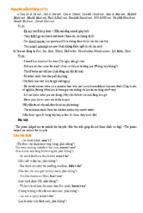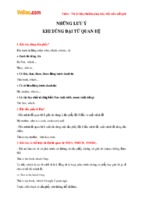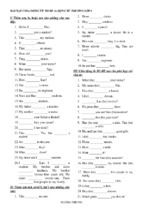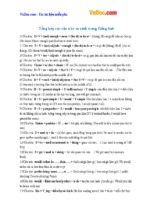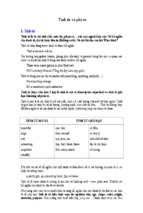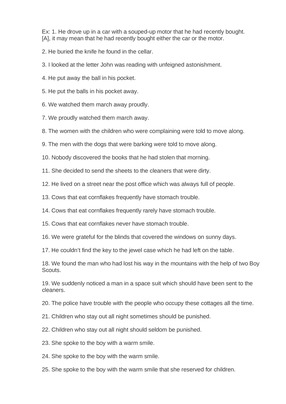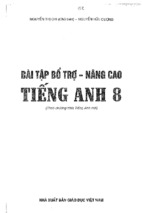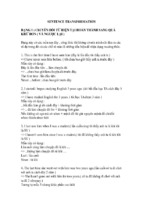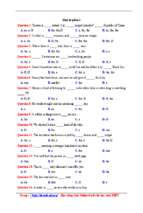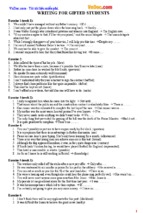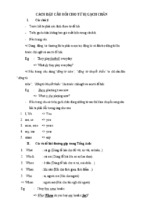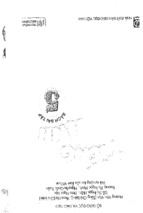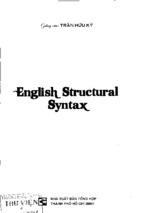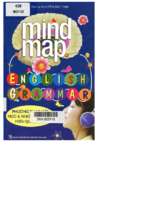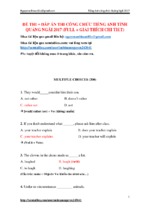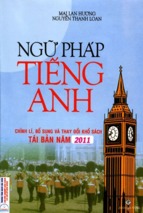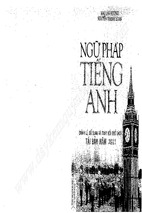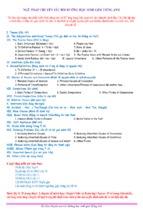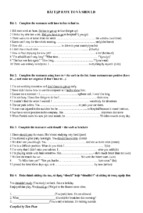Những lỗi phổ biến thường gặp trong tiếng Anh
Common Mistakes
in English
with Exercises
b y T. J. Fitikides, B.A.. F.I.L.
Senior English Master
The Pancyprian Gymnasium, Nicosia
Author of Key Words for Easy Spelling
Lessons in Greek-English
Translation
Errors, like straws, upon the surface flow;
He who would search for pearls must dive below.
John Dryden
Pearson Education Limited
Edinburgh Gate, Harlow
Essex CM20 2JE, England
and Associated Companies throughout the world
www.longman-elt.com
This edition © Pearson Education Limited 2002
The right of Timothy Fitikides to be identified as author of
this work has been asserted on his behalf in accordance
with the Copyright, Designs and Patents Act 1988.
All rights reserved; no part of this publication may be
reproduced, stored in a retrieval system, or transmitted
in any form or by any means, electronic, mechanical,
photocopying, recording, or otherwise without the
express permission of the Copyright holders.
First published 1936
Second edition 1937
Third edition 1939
Fourth edition 1947
Fifth edition 1963
Sixth edition 2002
Printed in Malaysia
ISBN 0 582 34458 1
Formatted by CjB Editorial Plus
Preface
Preface to the first edition
This book has been designed to meet the requirements of
students whose mother tongue is not English, Its main
purpose is to help to correct the common mistakes to which
foreign learners of English are liable.
The method adopted throughout this work is uniform. All
the errors dealt with are singled out, for they have to be
recognised before they can be corrected: then correct forms
are substituted for incorrect ones; finally, simple
explanations are given wherever necessary to justify
particular usages. Exercises are set al the end to ensure that
the principles may become firmly fixed in the students'
minds.
!t is no! claimed that this manual is exhaustive.
Nevertheless, the difficulties tackled are real, and the
examples arc representative of the mistakes commonly
made by foreign students of English, being the result of
observations made over a long period of time.
Much care has been given to the preparation of the Index,
which it ?s hoped will make the book a useful work ol
reference.
My acknowledgements are due to MrVV. H G. Popplestone.
who has read my manuscript and made many valuable
suggestions.
T. .J. F
August J 9.3ft
Preface to the Sixth Edition
It is now more than 60 years since this book was first
published. It has gone through many revisions, and additions
have been made at different times in its history. With the
millennium approaching it was decided that there were some
points of usage which are no longer relevant and so this new
edition has been prepared. The content has been completely
reviewed in the light of modern English usage, and the typefaces and design up-dated for clarity.
And yet the original concept and, indeed, most of the
original mistakes listed, are still pertinent to students of
English even in the year 2000. This little book has sold
several hundred thousand copies all over the world and
seems likely to go on doing so.
The author's note on how the book should be used is on
page vti, with an addition for this edition.
Useful lists and summaries
Have another look at...
Prepositions after certain words
Use of the gerund
Use of certain tenses
Negatives
Third person singular, simple present
Indefinite article
Verb TO BE
Definite article
Questions
Correct order of words
Use of certain prepositions
Use of will and shall
Singular and plural
Irregular verbs in everyday use
bear to He
light to write
14
19
27
37
50
53
55
68
79
82
88
106
130
198-199
200-201
How this book should be used
Tliis book is intended for two uses, it may be used as a
reference book and as an ordinary text book.
As a book of reference it should be consulted with every
composition. The teacher may refer the student to the
appropriate section dealing with his mistake by a number in
the margin of his exercise book. For example, a misuse of a
preposition of time (at, on or in) is indicated by 383 in the
margin to enable the student to look up his mistake and
correct it. This method has been tested and found more
effective than the common practice of writing the correct
form for the student. It is axiomatic that the greater the
student's individual effort, the more thorough will be his
learning.
With regard to its second use. as an actual text book, we
strongly recommend that the teacher should start off with
the exercises on pages 137 to 181.These are arranged under
the headings of the various parts of speech: nouns,
adjectives, pronouns, etc. However, before an exercise is
attempted, the teacher should make certain that the students
have comprehended the particular usage involved. An
occasional reference to some specific section may be made
whenever this is deemed necessary, but under no
circumstances is it advisable to go through the various
sections of the book consecutively- or to commit to memory
rules concerning usage.
Despite the fact that this book has been designed for two
separate uses, the writer is of the opinion that the best
results will be achieved if it is used by the student both as a
text book and as a book of reference.
T.J.F.
January 1961
While the above is still true, there is also a self-study use
for this little book. With more varied teaching materials
available now, it can also be used as a self-study book by
VII
Contents
Part 1 Misused forms
Using the wrong preposition
Misuse of the infinitive
Use of the wrong tense
Miscellaneous examples
Un-English expressions
1
13
18
28
40
Part 2 Incorrect omissions
Omission of prepositions,
Miscellaneous examples
46
49
Part 3 Unnecessary words
Unnecessary propositions
Unnecessary articles
Use of the infinitive
Miscellaneous examples
61
63
69
70
Part 4 Misplaced words
Wrong position of adverbs
Miscellaneous examples
75
77
Part 5 Confused words
Prepositions often confused
Verbs often confused
Adverbs often confused
Adjectives often confused
Nouns often confused
Confusion of number
Confusion of parts of speech
83
89
107
109
116
122
129
Exercises
137
Index
182
How this book should be used
students of English as a foreign language who are preparing
work either as part of their studies or for their occupations.
With a view to this, it is suggested that, when a question of
correct usage arises, the student should look first for the core
word in the index and so find the section detailing the usage.
For example, is it by foot or on foot? Look up foot in the
index and you will be directed to Section 13 which will
explain that on foot is correct.
Students and teachers will decide for themselves what is
the best way to use this book. What is constant is the quality
of content and how helpful it is to all those who use English
as a foreign language.
VIII
Part 1
used forms
Using the wrong preposition
Mistakes are often made by using the wrong preposition
after certain words. The following list includes the words
which most often give trouble:
1
/
2
/
Absorbed (- very much interested) in, not at.
Don't say: The man was absorbed at his work.
Say: The man was absorbed in his work.
Accuse of, not for.
Don't say: She accused the man for stealing.
Say: She accused the man of stealing.
N o t e : Charge t a k e s w i t h
3
/
1
The man was charged
/
murder.
Accustomed to, not with.
Don't say: I'm accustomed with hot weather.
Say: I'm accustomed to hot weather.
N o t e : Also used to: He is used
4
with
to the heat.
Afraid of, not from.
Don't say: Laura is afraid from the dog.
Say: Laura is afraid of the dog.
1
Part 1
5
/
Aim at, not on or against.
Don't say: She aimed on {or against) the target.
Say: She aimed at the target,
Mote
U s e t h e preposition at to d e n o t e d i r e c t i o n , t h r o w a t , shout at, fire
at, shoot at. S h o o t ( w i t h o u t t h e at) m e a n s to kill He shot
a bird (= h e hit
a n d killed it)
6
/
Angry with, not against.
Don't say: The teacher was angry against him.
Say: The teacher was angry with him.
n o t e I W e g e t angry w i t h a p e r s o n b u t at a t h i n g
weather
'not
He was angry
at The
with the weather)
Mote 2 A l s o a n n o y e d w i t h , v e x e d w i t h , indignant w i t h a p e r s o n , b u t a t
a thing.
7
Anxious (= troubled) about, not for.
Don't say.'They're anxious for his health.
•/ Say: They're anxious about his health.
Noie
for
8
/
Anxious m e a n i n g w i s h i n g v e r y much l a k e s for Parents
their children's
U s e arrive in w i t h c o u n t r i e s a n d l a r g e cities. Mr Smith
London
/
anxious
Arrive at, not to.
Don't say: We arrived to the village at night.
Say:: We arrived at the village at night.
Note
9
are
success.
( o r New York. India,
has arrived
etc )
Ashamed of, not from.
Don't say: He's now ashamed from his conduct.
Say: He's now ashamed of his conduct.
Note
it isn't correct to u s e ashamed of m e a n i n g shy
Ashamed means
feeling s h a m e or guilt a b o u t s o m e t h i n g . Shy m e a n s f e e l i n g n e r v o u s w i t h
someone
I n s t e a d of s a y i n g I'm ashamed
I'm shy of my
2
1
teacher
(or shamed)
of my teacher, say
in
Misused forms
10 Believe in, not to.
Don't say: We believe to God.
/ Say: We believe in God.
N o t e : To believe in m e a n s t o h a v e faith i n . To b e l i e v e ( w i t h o u t t h e in) m e a n s
t o r e g a r d s o m e t h i n g as t r u e : / believe
11
/
everything
he says.
Boast of or about, not for.
Don't say: James boasted for his strength.
Say: James boasted of (or about) his strength.
12 Careful of, with or about, not for.
Don't say: Elke's very careful for her health.
/ Say: Elke's very careful of/about her health.
Or: You should be more careful with your money.
Note
Take care of' He takes
care
of his money.
13 Travel by train, etc., not with the train, etc.
Don't say: He travelled with the train yesterday.
/ Say: He travelled by train yesterday.
N o t e : W e say: by t r a i n , by b o a t , by plane, by bike; also, by l a n d , by sea,
by air, by bus; in a bus o r o n a bus; by car o r in a car, by t a x i o r in a taxi;
on horse-back, on a donkey, o n a bicycle; o n f o o t .
14
/
Complain about, not for.
Don't say: Annette complained for the weather.
Say: Annette complained about the weather.
Note
W h e n t a l k i n g a b o u t illness w e u s e complain of. W e say She
complained
15
/
of a sore
throat.
Composed of, not from.
Don't soy: Our class is composed from thirty students.
Say: Our class is composed of thirty students.
3
Part 1
16 Confidence in, not to.
Don't say: I have great confidence to you.
/ Say: I have great confidence in you.
Note
In confidence: Let me tell you something
in confidence
{= a i a secret)
17 Conform to, not with.
Don't say:'We must conform with the rules.
/ Say. We must conform to the rules.
Noie
comply l a k e s w i t h . We'll
comply
with
your
request.
18 Congratulate on, not for.
Don't say: I congratulate you for your success.
/ Say: I congratulate you on your success.
19 Consist of, not from.
Don't say: A year consists from twelve months.
/ Say: A year consists of twelve months.
Note
Take great c a i e n e v e r t o u s e consist in t h e passive i o r m .
20 Covered with, not by.
Don't say: The mountains are covered by snow.
/ Say: The mountains are covered with/in snow.
21
/
Cure of, not from.
Don't say: The man was cured from his illness.
Say: The man was cured of his illness.
N o i e T h e n o u n cure takes for
1
There is no cure
for that
22 Depend on or upon, not from.
Don't say: It depends from her.
/ Say: It depends on (or upon) her.
Note
Rely on or u p o n ' can't
rely
on (or upon)
him.
disease
Misused forms
23
/
24
/
Deprive of, not from.
Don't say: Nelson Mandela was deprived from his
freedom.
Soy: Nelson Mandela was deprived of his freedom.
Die of an illness, not from an illness.
Don't say: Many people have died.from malaria.
Say: Many people have died of malaria.
Note
P e o p l e die of illness, of h u n g e r , of thirst, of or f r o m w o u n d s ; from
o v e r w o r k ; b y v i o l e n c e , fay t h e s w o r d , by p e s t i l e n c e ; in b a t t l e ; for their country,
for a c a u s e , t h r o u g h n e g l e c t ; on t h e s c a f f o l d ; a t t h e s t a k e .
25
/
26
/
/
Different from, not than.
Don't say: My book is different than yours.
Say: My book is different from yours.
Disappointed by, about or at, not from.
(a) by/at/about:
Don't say: Phillipa was disappointed from the low
mark she got in the test.
Say: Phillipa was disappointed by/about/at the low
mark she got in the test.
(b) with/in:
Don't say: Jane was disappointed from her son.
Say: Jane was disappointed with/in her son.
Mote
1
B e f o r e a p e r s o n w e u s e w i t h o r in, b e f o r e a t h i n g w e u s e at, about or
b y a n d b e f o r e a g e r u n d w e u s e at: Keith
is very disappointed
the prize. W e u s e t h a t ( o p t i o n a l b e f o r e a n e w c l a u s e ) ' / w a s
(that)
27
/
I didn't
get an
at not
winning
disappointed
invitation.
Divide into parts, not in parts.
Don't say: I divided the cake in four parts.
Say: I divided the cake into four parts.
Note
(or in
A t h i n g m a y b e d i v i d e d in half or in t w o
Paul divided
the apple
in
half
two).
5
Part 1
28
/
No doubt (n) of or about, not for.
Don't say: I've no doubt for his ability.
Say: I've no doubt of (or about) his ability.
Note- Doubtful of: / am doubtful
29
/
of his ability
to p a s s
Dressed in, not with.
Don't say: The woman was dressed with black.
Say:The woman was dressed in black.
Note
The woman
1
ivas in black
is also correct
30 Exception to, not of.
Don't say: This is an exception of the rule.
/ Say: This is an exception to the rule.
N o t e : W e say w i t h t h e exception of: She liked all her subjects
exception
of
with
the
physics
31 Exchange for, not by.
Don't say: He exchanged his collection of matchboxes
by some foreign stamps.
/ Say: He exchanged his collection of matchboxes for
some foreign stamps.
Note
1
In exchange f o r H e gave
them
his old car in exchange
for a new one.
32 Fail in, not from.
Don't say: Steven failed from maths last year.
/ Say: Steven failed in maths last year.
33 Full of, not with or from.
Don't say: The jar was full with (or from) oil.
/ Say: The jar was full of oil.
Note
6
1
Fill takes w i t h
J a n e filled t h e glass w i t h w a t e r
Misused forms
34
/
35
/
36
/
Getridof, not from.
Don't say: I'll be glad to get rid from him.
Say: I'll be glad to getridof him.
Glad about, not from or with.
Don't say: Francis was glad from (or with) receiving
your letter.
Say: Francis was glad about receiving your letter.
Good at, not in.
Don't say: My sister's good in maths.
Say: My sister's good at maths.
Note 1 : B a d at, clever at, quick at, slow at, etc. However, w e a k in: He's
weak
in
grammar.
Note 2 : He's good
37
/
38
/
39
/
in class means that his conduct is good.
Guard against, not from.
Don't soy: You must guard from bad habits.
Say; You must guard against bad habits.
Guilty of, not for.
Don't say: He was found guilty for murder.
Say: He was found guilty of murder
Independent of, not from.
Don't say: Clare's independent from her parents.
Say: Clare's independent of her parents.
Note: W e say d e p e n d e n t o n : A child
40
/
is dependent
on its
parents.
Indifferent to, not for.
Don't say: They're indifferent for politics.
Say;They're indifferent to politics.
7
Part 1
41 Insist on, not to.
Don't say: He always insisted to his opinion.
/ Say: He always insisted on his opinion.
No'.e
Persist take;, i n He persisted
in his silly
ideas
42 Interested in, not for.
Don't say: She's not interested for her work.
/ Say: She's not interested in her work.
Also take an interest in She takes
Note
a great
interest
in
music
43 Jealous of, not from.
Don't say: He's very jealous from his brother.
/ Say: He's very jealous of his brother.
44 Leave for a place, not to a place.
Don't say:They're leaving to England soon.
/ Say: They're leaving for England soon.
45 Live on, not from.
Don't say: He lives from his brother's money.
/ Say: He lives on his brother's money.
.Note Feed o n
1
Some
birds feed
on
insects
46 Look at, not to.
Don't say: Look to this beautiful picture.
/ Say: Look at this beautiful picture.
N o t e Also gaze at, stare at, e t c B u i . look after (= t a k e c a r e o f ) ; look for
1
(= t r , to find), look over (= e x a m i n e ) ; look into (= e x a m i n e closely), look on
or upon (= consider), look d o w n o n (= h a v e a l o w o p i n i o n o f ) , look up to
!= r e t p r j .
ec
;
|
0 0
k
o
u
look to (= rely o n )
t f
o r
;= expect); look f o r w a r d t o (= e x p e c t w i t h p'easure),
Misused forms
47
'
f
Pfe-rded to, not with.
Dcrfi say: Angela was married with a rich man.
Say: Angela was married to a rich manNote
Also engaged to
Sally
was engaged
to Peter
for a year
be'cre
tney go;
married.
48
-/
Opposite to, not from
Don't say:Their house is opposite from ours.
Say: Their house is opposite to ours.
Note
49
/
O p p o s i t e ours is also c o r r e c t
Pass by a place, not from a place.
Don't say: Will you pass from the post-office?
Say: Will you pass by the post-office?
Note
A l s o pass t h e post-office is c o r r e c t .
50 Play for a team, not with a team.
Don't say: He plays regularly with that team.
/ Say: He plays regularly for that team.
51
/
Pleased with, not from.
Don't say:The teacher is pleased from me.
Say: The teacher is pleased with me.
N o t e . W e say pleased at or pleased w i t h if a n a b s t r a c t n o u n or a c l a u s e
f o l l o w s ; They were
(or with)
52
/
pleased
at (or with)
what
he said; They were pleased
et
her results
Popular with, not among.
Don't say: John's popular .among his friends.
Say: John's popular with his friends.
53 Prefer to, not from.
Don't say: I prefer a blue pen from a red one.
J Say: I prefer a blue pen to a red one.
Note
A ' s o preferable to
This car is preferable
to niy old one.
Q
Part 1
54
/
Preside at or over, not in.
Don't say: Who presided in the last meeting?
5ay:Who presided at (or over) the last meeting?
55 Proud of, not for.
Don't say: He's very proud for his promotion.
/ Say: He's very proud of his promotion.
Note
56
/
W e say take \ai pride in
A craftsman
takes
a pride
in his work
Rejoice at or in, not for.
Don't say: We rejoiced for her success.
Say: We rejoiced at (or in) her success.
57 Related to, not with.
Don't say: Are you related with Simon in any way?
•/ Say Are you related to Simon in any way?
Note
Also relation to. Is he any relation
to
you?
58 Repent of, not from.
Don't say: He repented from his crime.
/ Say: He repented of his crime.
Note
Repentance ^akes for . H e feels repentance
-
lor his s i n
59 Satisfied with, not from.
Don't say: Are you satisfied from your marks?
/ Say: Are you satisfied with your marks?
Noty Also content w i t h , delighted w i t h , unhappy w i t h , happy w i t h ,
displeased w i t h , dissatisfied w i t h , disgusted with.
60
/
10
Similar to, not with.
Don't say: Your house is similar with mine.
Say: Your house is similar to mine.
Misused forms
61
/
Sit at a desk etc., not on a desk etc.
Don't say: The bank manager was sitting on his desk.
Say: The bank manager was sitting at his desk.
Note
A l s o sit at a table. B u t on a chair, o n a bench, on a sofa, e t c ; in an
arm-chair, in a tree o r u p a tree. A bird s o m e t i m e s perches (= sitsl on a tree
62
/
63
/
Spend on, not for.
Don't say: \ spend a lot of time for my computer.
Say: I spend a lot of time on my computer.
Succeed in, not at.
Don't say: 1 hope he'll succeed at his work.
Say: I hope he'll succeed in his work.
N o t e . A p e r s o n succeeds t o a property, a title, or a n o f f i c e : Queen
succeeded
64
/
to the throne
Elizabeth
I!
in 1952 A l s o o n e p e r s o n C3n succeed a n o t h e r .
Superior to, not from or than.
Don't say: This is superior from (or than) that.
5«y.This is superior to that.
N o t e A l s o inferior to, junior t o , senior t o , subsequent to, prior to.
65
/
Sure of, not for.
Don't say: I'm quite sure for her honesty.
Say: I'm quite sure of her honesty.
N o t e : A l s o certain of
66
/
I em quite
certain
of >t
Surprised at or by, not for.
Don't say: Harold was surprised for the loud bang.
Say: Harold was surprised at/by the loud bang.
N o t e . Also astonished at/by, amazed at/by, alarmed at/by, pu2zled at/by,
shocked at/by
Part 1
Have another look at...
Prepositions after certain words
Note carefully the prepositions used after the follow in
words:
accuse of
accustomed to
afraid of
aim at
angry with, at
arrive at. in
ashamed of
believe in
boast of
careful of, with, about
complain about
composed of
conform to
congratulate on
consist of
cure of
depend on
deprive of
die of
different from
dressed' m
fail in
full of
good Ql
guard against
guilty of
independent of
indifferent to
insist
interested in
jealous of
look at
married to
no doubt of or about
pleased wit it
prefer to
proud of
related ro
repent of
satisfied with
similar to
succeed in
superior to
sure of
surprised at, by
suspect of
tired of
translate into
warn of, about
- Xem thêm -

